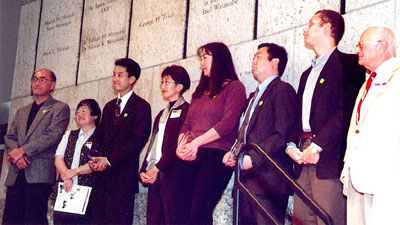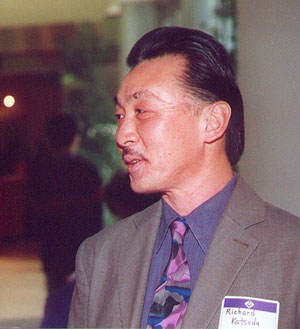
By Richard Katsuda
 |
| Volunteer lawyers who worked pro bono for redress, were acknowledged by NCRR. (Click on the image to enlarge). |
Over the last few years NCRR has been working with members of the Japanese American Bar Association to develop strategies and file redress cases.
As a team, we have filed four lawsuits in the Consolo/Ishida category of redress claimants. These claimants are children born after their parents had "voluntarily" left the West Coast or left camp. After a lawsuit by Linda Consolo, in which her attorney, Gerald Sato, successfully argued that Ms. Consolo had been prohibited from returning to her domicile (in legal terms her fixed, permanent residence, the same as her parents’ legal domicile on the West Coast), the Office of Redress Administration (ORA) made claimants in this category eligible for redress. ORA, however, set an eligibility cutoff birth date of Jan. 20, 1945 by arguing that, because the last main order rescinding exclusion from the West Coast took effect on that date, anyone born after that date was no longer legally prohibited from returning to their domicile.
To challenge ORA’s argument, the legal team filed four cases. Carole Song, represented by Lisa Ikemoto, won her case and was awarded redress. Ms. Ikemoto successfully argued that Ms. Song’s parents had received inadequate notice of the rescission order.
Carol Higashi, represented by Julia Mass and Scott Yamaguchi, recently lost her case before the U.S. Court of Appeals for the Federal Circuit. The cases for Wendy Hirota, represented by Alex Fukui and Patrick Hattori, and for Robert Murakami, represented by John Ota (an NCRR member in the San Francisco Area), are pending.
 |
Richard Katsuda co-chair of NCRR Los Angeles speaking at day of remembrance.
|
NCRR is itself a plaintiff in NCRR and Suzuki v. U.S., in which we charge the U.S. government of malfeasance for failure to invest the redress fund as required by the Civil Liberties Act. NCRR, represented by Christopher Prince of McCutchen, Doyle, Brown & Enersen, states that, had the government properly invested the fund, there would have been sufficient money to fund the entire $50 million intended by Congress for public education (only $5 million was allocated) and to redress Japanese Latin Americans (JLAs) with the same measure of justice that Japanese Americans (JAs) received (JLAs received $5,000 each, whereas JAs received $20,000). A ruling is pending from the federal Ninth Circuit Court of Appeals.
NCRR has also been supporting the Campaign for Justice for Japanese Latin Americans. Please see the enclosed information sheet for more information.
|

